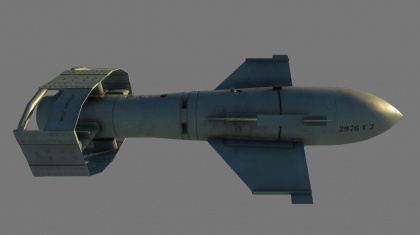PC 1400 X (1,400 kg)
Contents
Description
The 1,400 kg PC 1400 X is a German manually-guided gliding bomb. It was introduced in Update 1.77 "Advancing Storm".
Vehicles equipped with this weapon
General info
The Fritz-X is a guided armour-piercing gliding bomb weighing circa 1.5 tons, with an explosive payload of 320 kg. It was equipped with a stabilizer and fins as well as a set of radio equipment. The bomb trajectory could be tracked visually from the launching bomber through the bomb sight (bright tracing lights lit up in the tail section of the bomb after launch) and corrected by radio signal using a special joystick. It was mainly used as an anti-ship weapon.
| Bomb characteristics | |
|---|---|
| Guidance | MCLOS |
| Mass | 1,570 kg |
| Explosive mass | 320 kg |
| Explosive type | Amatol |
| TNT equivalent | 320 kg |
| HE max penetration | 98 mm |
| Armour destruction radius | 14 m |
| Fragment dispersion radius | 100 m |
Effective damage
Describe the type of damage produced by this type of bomb (high explosive, splash damage, etc)
Comparison with analogues
Give a comparative description of bombs that have firepower equal to this weapon.
Usage in battles
Describe situations when you would utilise this bomb in-game (vehicle, pillbox, base, etc)
Pros and cons
Pros:
- Bomb can be guided into the target
- Good for high altitude bombing cruisers and large slow-moving targets
- Very effective against capital ships as it can be used from outside of their anti-aircraft range
Cons:
- Relatively small warhead (comparable to a normal 500 kg bomb)
History
The PC 1400 X was nicknamed "Fritz X", becoming the first precision guided munition used in combat. The Fritz X entered active service on 21 July 1943 against targets in a Sicilian harbour, but without any confirmed kill. The biggest success of the weapon was sinking of the Littorio-class battleship Roma on 8 September 1943 by scoring 2 direct hits and causing magazine explosion. The bomb used MCLOS guiding (Manual Command to Line Of Sight) via radio link. Approximately 1,400 were built.
Media
- Vieos
See also
Other WWII guided weapons:
External links




